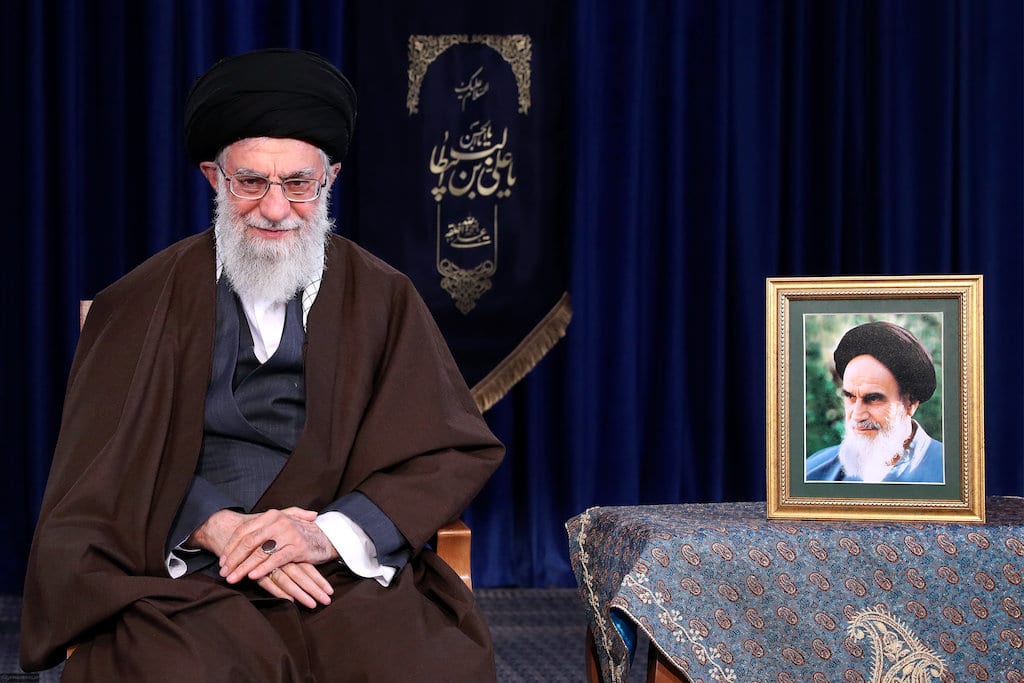LATEST
As Iran faces continued economic difficulties, the Supreme Leader has appealed to Iranians to help his “Resistance Economy” through the purchase of domestic products.
In a video address for the Iranian New Year, Ayatollah Khamenei said domestic production is “the pivotal” issue:
The key is the domestic production and if it is speeded up, many of the problems would go away….
This is not the concern of officials alone but the people from all walks of life can contribute to it. To the very sense of the word, they can have a part.
New Year's slogan for 1397 is “Support for Iranian Products”. If national production is accelerated, many problems will be resolved. I have chosen this as the center of this year’s slogan.
Full text of the message: https://t.co/atz7xU8i6T #Nowruz pic.twitter.com/6aG205bApa— Khamenei.ir (@khamenei_ir) March 20, 2018
Khamenei said he would elaborate on the promotion of domestic production in an upcoming address from the holy city of Mashhad: “May God assist both our officials and people so they could fulfill their responsibilities in the best way possible and could make this motto of the year, which is supporting Iranian products, come true to the very sense of the word.”
Iran has struggled for recovery after implementation of the nuclear deal with the 5+1 Powers in January 2016, amid ongoing and new US sanctions and domestic problems including unemployment, mismanagement, and a weak currency. In January, nationwide demonstrations included protests over the economic situation, and strikes and rallies over unpaid wages are ongoing at some companies.
The Supreme Leader first invoked the “Resistance Economy” in 2012 as US and international sanctions were tightened over the Iranian nuclear program.
While the European Union and European signatories — the UK, France, and Germany — have held out against any abandonment of the nuclear deal, they are calling for a separate agreement over Iran’s ballistic missile program. Tehran is holding out against an arrangement, saying its missiles are only for defensive purposes and cannot carry nuclear warheads.
Khamenei Claims “Grandeur and Might”
Ayatollah Khamenei insisted on Tuesday that mass support had been demonstrated by turnout in the May 2017 Presidential election that returned Hassan Rouhani to office, February rallies for the anniversary of the 1979 Islamic Revolution, and marches responding to the “scattered riots” of January’s protests:
The sweet part of the past year was the realization of the grandeur and the might of the nation and people’s active participation, from the beginning of the year to its end.
He also declared that “Iran successfully managed to overcome foreign threats”.
But Khamenei returned to the economic challenge: “What is important is that everybody should work hard….Our main concern this year is yet again the issue of economy and people’s living conditions.”
Rouhani: “Surprised All Enemies”
In his Nowruz address, President Rouhani gave ritual support to Khamenei’s message: “As the Supreme Leader said, the new year is the year of national production, supporting Iranian goods, and the year of employment and progress”.
Rouhani also toed the Supreme Leader’s line on the January protests, “When our people saw unrest on the streets and felt that the security of their society was in danger, they came on the stage and announced it clearly that criticism and protest are people’s right but they would not tolerate violence and unlawfulness”.
And he declared that this had been a success rather than a warning sign over economic and politics issues: “The unity among the Iranian nation has surprised all enemies, and they admitted to the greatness of our people.”
Rouhani did acknowledge the issues of unemployment and poverty, but maintained, “Although there are still many problems remaining, we have time to compensate for the past shortcomings.”
Zarif Blasts Trump’s “Insult” on Iranian New Year
Foreign Minister Mohammad Javad Zarif has hit back sharply against Donald Trump’s message for Iranian New Year.
Earlier this week Trump followed White House practice, established by Barack Obama, with the message. However, in contrast to Obama, Trump used the occasion to criticize Iranian officials as “rulers who serve themselves instead of serving the people” and to label the Revolutionary Guards a “hostile army”.
Zarif used Twitter to reply both to Trump and to Saudi Arabia’s effective ruler Crown Prince Mohammad bin Salman, who is currently in Washington:
With millennia of civilization, Iranians have the historical depth to ignore the absurd insults of an arriviste leader; one whose entire command of history, politics and diplomacy can be condensed into 280 characters – but even so, still superior to his juvenile royal stooge.
— Javad Zarif (@JZarif) March 20, 2018

